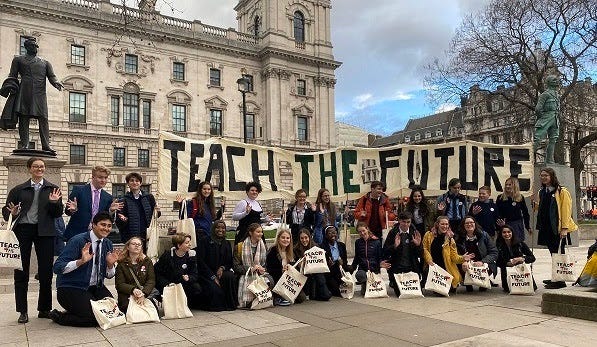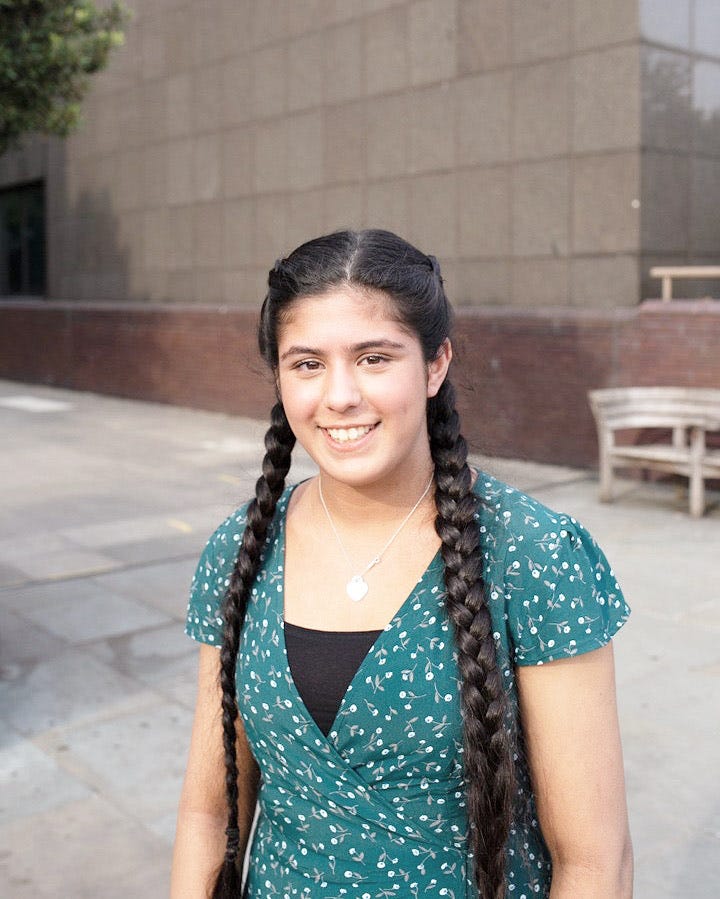Whose fault is climate change?
We've been blaming ourselves a little too long
Simple climate action // I S S U E # 2 1 // C L I M A T E D E S P A I R
Older generations may feel they’re over environmental protests. A new generation is turning out by the millions. Students around the world are channeling their anxiety and anger over the deteriorating climate into action.
This week, 16-year-old Scarlett Westbrook explains how climate activism has become such a defining part of her life, and her generation. Three years ago, Scarlett became the youngest person in the world to achieve an A-level qualification in Government and Politics, normally taken at age 18. Today, she’s the policy expert for the UK’s Student Climate Network which helped rally 300,000 students for the country’s school strikes, joining 4 million others around the world. She’s now fighting to change how global warming is taught at schools in the UK.
Her philosophy is that we can’t care for the planet if we don’t care for each other. In response to Covid-19, community mutual-aid groups were set up by climate campaigners who set out to make sure that people affected by government austerity measures did not go hungry. “Grassroots climate activism started with indigenous people looking after the planet because they knew that they needed it to survive, and to protect their tribes and families,” she says. “Now, we’ve realized that we must care for each other as activists as we endeavor to fight for climate justice.”
Jemima Kiss
Scarlett Westbrook: Rethinking our climate education
When I was five years old, my school started an eco-council with representatives from each year group to make the school more environmentally friendly. As the youngest member, my main job was to color in the older children’s suggestions on posters we’d hang around the school. I remember teachers drilling into us our responsibility to be more eco-conscious: our individual impacts had enormous global repercussions.
Now that I’m a British climate justice activist, the ghost of this perceived individual responsibility has haunted me. By the time most of us have learned about the climate crisis, we have spent years absorbing blame as individuals. This narrative tells us our everyday actions are responsible for the climate crisis.
Yet this rewrites history. It prioritizes things like our ‘carbon footprint,’ popularised by BP, one of the biggest global carbon emitters, over holding governments and corporations accountable for their actions. We subconsciously possess guilt that should not be ours: If we had gone vegan earlier or had shorter showers, we wouldn’t be in this position, right?
Many times, I’ve spiraled into despair over the climate catastrophe, panicking over natural disasters, or lost sleep over decades of delay in meeting our climate goals. I’ve watched people’s mental health deteriorate as action is met with government apathy. I’ve seen teenager climate organizers burn out more than once.
I’ve realized that we can’t look after the planet if we’re not looking after ourselves. For us to truly resist the systems perpetuating the climate crisis, we must reject notions of corporate-driven individualism that trap people in poverty and oppression. Every step against inequality moves us closer to climate justice. We can’t claim to oppose the systems perpetuating the climate crisis if we replicate them in our own lives.
The climate crisis isn't our fault. It is the result of extractive forms of capitalism and colonialism, spearheaded by elites without an incentive to stop their destruction, and every incentive to continue it. Just 100 companies are responsible for 71% of global carbon emissions. Among the 184 countries signed up to the Paris Agreement, most are failing to meet their commitment to decarbonize by 2030,
Mutual aid groups have emerged in the wake of the Covid-19 pandemic. Young climate activists are playing a key role across the country by delivering food parcels, checking on vulnerable people, and providing essentials. Although this may not feel like climate action, these groups have shown how we can pull together to overcome disaster and a way forward on climate.
Power doesn’t lie solely in Parliament. It resides in people and in communities. The British school climate strikes pressured our government to declare a national climate emergency. A few thousand school children helped make this happen.
Individualism has often silenced us into hopelessness. But this isn’t inevitable. Hope turned into collective action is a revolutionary tactic that makes another world possible. Together, we can ensure we are all looked after and our voices are heard until the establishment must act.

Got two minutes? Tell us how to make Hothouse better!
Journalists! We want your pitches. Email editors@hothouse.solutions for a full brief
Hothouse is a weekly climate action newsletter written and edited by Jemima Kiss, Mike Coren and Jim Giles. We rely on readers to support us, and everything we publish is free to read.








